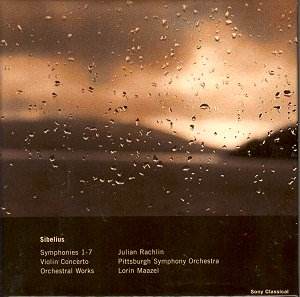Maazel’s Sony collaboration was made in Pittsburgh over three years from 1990 to 1992. By then
thirty years had passed since the perennially well-selling cycle he made
with, of all people, the Vienna Philharmonic.
Warmth, retrospect and nostalgia
pervade these readings. The subtly softened recording is consonant with
that emphasis.
Right from the start of the
First Symphony, with its rounded wind legato, the leisurely accent emerges.
This is utterly charming if you are in the mood but many will prefer
a more Technicolor approach and greater angularity - the sort of thing
we find in Maazel's VPO series (Decca and
Eloquence), Collins (Beulah now deleted but probably still findable)
and in Barbirolli's EMI Classics version of
the First (this really should be liberated from the boxed set) or the
same conductor's Second Symphony (essential Sibelius on Chesky
- not the EMI version).
The recording is pleasingly
detailed in perspective and in catching passing detail. It does however
give the impression of soft focus which is apt enough when finding Sibelius
in mysterious mood but tends to moderate the drama I hunger for especially
in the First Symphony. Stokowski's National
PO recording, Barbirolli's or Collins' are
more successful.
In the Seventh Symphony Maazel
stands at the far pole from the forbidding reference version of Evgeny
Mravinsky and the Leningrad PO (Olympia or BMG-Melodiya). While the 1965 Moscow live concert was primitively recorded by comparison
with the resplendently rounded Sony sound, Maazel
fritters away much of the tension. This is not a recommendable version.
The Second Symphony suffers
also from loose reins though I did enjoy the definition of the woodwind
in the first section of the first movement. The brass barks in the third
movement come across very well. It lacks however the incandescence of
the 1950s Beecham performance in the RFH (with Beecham yawping his exhortations
to the orchestra like a corpulent magus) or Ormandy on Sony or Hannikainen
on EMI. I have already mentioned the superb Barbirolli on Chesky.
The last movement of the Second seems to find Maazel
in much more alert form but by then it is too late.
The Fourth's gutturals are huskily
rendered and although there is languor Maazel
capitalises on opportunities for dramatic statements. The instrumental
solos including the dialogue between the viola and cello principals
in the finale are beautiful. The Fifth Symphony is also good and at
2.29 a shuddering string figure emerges with a clarity I have never previously heard - wondrous stuff. Here
again I felt wooed by the detail rather than being won over by the grand
sweep of the piece.
Maazel hits unequivocally superb form in the Sixth Symphony which I enjoyed
greatly. Luminous string sound (OK not as luxuriant as Philadelphia but certainly starry and nicely etched). The
elusive 'Midnight Sun' mood engages Maazel - that much is very clear. A lovely
recording. Similarly strong is the Third Symphony which is taut
and finds the Pittsburgh orchestra in cracking form responding with gleeful alacrity to Maazel and relishing the cooling woodwind writing without
becoming soporific.
En Saga is also extremely well done with some instrumental strokes driven urgently in
a very acceptable way. It stands a degree down from Horst Stein (Decca)
though the Stein derives some of its unshaken grip from microphone placement
and balance that spots and zooms in the aural equivalent of cherry-picking.
Even so this is another extremely good version as is the Karelia music. Each little string rictus
in the rocking closure of the piece from 15.12 onwards testifies to
the recreative qualities Maazel found
during these sessions. All the same I rather lament that a more imaginative
selection of tone poems was not made. Pohjola's
Daughter, The
Oceanides, The Bard and Nightride and Sunrise
would have been welcome here if only the 'Steel Town' sessions had included these works. The Swan and Finlandia
are middle of the road though again sensitively well recorded
and in the case of Finlandia showing an openness to gaunt drama
- though nothing like as dark as Barbirolli on EMI or Stein on Decca.
Julian Rachlin
has a rapturously wide tonal armoury. From the very opening of the Concerto
he demonstrates an imaginative reach; his sound being slender yet nectar-sweet.
What is more, Maazel and the Pittsburghers catch the same kindling spirit.
There is an alacrity and engagement about their
playing that is not always present in the symphonies. Rachlin
deserves consideration alongside Spivakovsky
(Everest), Oistrakh (BMG-Melodiya) and Mullova (Philips). This is no also-ran and neither is the
gentle second serenade. I only lament that Rachlin
did not complete the picture with the other serenade and the Six Humoresques
(if you don't know these pieces you must hear them - try Rosand
on Vox).
There are no background notes
only detailed listings; not surprising given the bargain price. The
box is flimsy and the print used is rather small.
Maazel souses these readings in a challenging luxuriance of detail. I missed
the implacable surge and urgency to be found in other readings although
at the level of incident and character, long-practised Sibelians
will find much to unsettle and stimulate especially in strong versions
of symphonies 3, 4, 5 and 6 and in a knockout performance of the concerto.
Not commendable as a standard set (for that try Sakari
or more reliably Vänskä on Bis) and weak in symphonies 1, 2
and 7. However at bargain price this will reward the dedicated listener.
Rob Barnett

